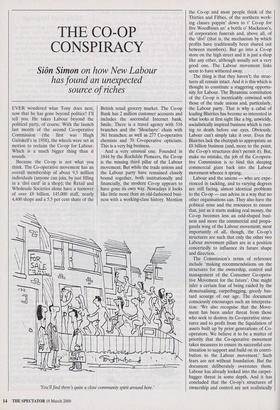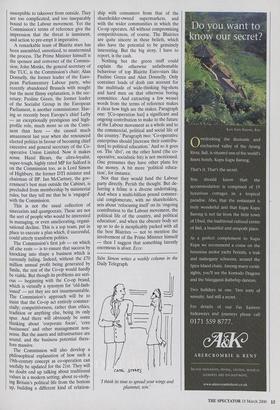THE CO-OP CONSPIRACY
Sion Simon on how New Labour
has found an unexpected source of riches
EVER wondered what Tony does next, now that he has gone beyond politics? I'll tell you. He takes Labour beyond the political party, of course. With the launch last month of the second Co-operative Commission (the first was Hugh Gaitskell's in 1958), the wheels were set in motion to reclaim the Co-op for Labour. Which is a much bigger thing than it sounds.
Because the Co-op is not what you think. The Co-operative movement has an overall membership of about 9.5 million individuals (anyone can join, by just filling in a ‘divi card' in a shop); the Retail and Wholesale Societies alone have a turnover of over £8 billion, 145,000 staff, nearly 4,400 shops and a 5.5 per cent share of the British retail grocery market. The Co-op Bank has 2 million customer accounts and includes the successful Internet bank, Smile. There is a travel agency with 516 branches and the `Shoefayre' chain with 361 branches; as well as 277 Co-operative chemists and 70 Co-operative opticians. This is a very big business.
And a very unusual one. Founded in 1844 by the Rochdale Pioneers, the Co-op is the missing third pillar of the Labour movement. But while the trade unions and the Labour party have remained closely bound together, both institutionally and financially, the modern Co-op appears to have gone its own way. Nowadays it looks like little more than an old-fashioned busi- ness with a working-class history. Mention `You'll find there's quite a close community spirit around here.' the Co-op and most people think of the Thirties and Fifties, of the northern work- ing classes poppin' down to t' Co-op for five Woodbines an' a bottle o' Mackeson's, of corporation funerals and, above all, of the `divi' (that is, the mechanism by which profits have traditionally been shared out between members). But go into a Co-op store on the high street and it is just a shop like any other, although usually not a very good one. The Labour movement links seem to have withered away.
The thing is that they haven't; the struc- tures all remain intact. And it is this which is thought to constitute a staggering opportu- nity for Labour. The Byzantine constitution of the Co-op is inextricably entwined with those of the trade unions and, particularly, the Labour party. That is why a cabal of leading Blairites has become so interested in what looks at first sight like a big, unwieldy, socialistically inspired business which is rust- ing to death before our eyes. Obviously, Labour can't simply take it over. Even the Blairites lack the chutzpah to appropriate an £8 billion business (and, more to the point, the Co-op's structures don't permit it). But, make no mistake, the job of the Co-opera- tive Commission is to bind this sleeping commercial giant back into the Labour movement whence it sprang.
Labour and the unions — who are expe- rienced in tackling, and to varying degrees are still facing, almost identical problems to the Co-op — can advise in a way that no other organisations can. They also have the political nous and the resources to ensure that, just as it starts making real money, the Co-op becomes less an odd-shaped busi- ness and more the commercial and propa- ganda wing of the Labour movement; most importantly of all, though, the Co-op's structures are such that only the other two Labour movement pillars are in a position concertedly to influence its future shape and direction.
The Commission's terms of reference include 'making recommendations on the structures for the ownership, control and management of the Consumer Co-opera- tive Movement for the future'. One might infer a certain fear of being raided by the demutualising, carpetbagging, greedy bas- tard scourge of our age. The document consciously encourages such an interpreta- tion: 'We also recognise that the Move- ment has been under threat from those who seek to destroy its Co-operative struc- tures and to profit from the liquidation of assets built up by prior generations of Co- operators. We believe it to be a matter of priority that the Co-operative movement takes measures to ensure its successful con- tinuation to support and build on its contri- bution to the Labour movement.' Such fears are not without foundation. But the document deliberately overstates them. Labour has already looked into the carpet- bagger threat in some depth. And it has concluded that the Co-op's structures of ownership and control are not realistically susceptible to takeover from outside. They are too complicated, and too inseparably bound to the Labour movement. Yet the Commission's terms of reference give the impression that the threat is imminent, and action to pre-empt it imperative.
A remarkable team of Blairite stars has been assembled, unnoticed, to mastermind the process. The Prime Minister himself is the sponsor and convener of the Commis- sion; John Monks, the general secretary of the TUC, is the Commission's chair; Alan Donnelly, the former leader of the Euro- pean Parliamentary Labour party, who recently abandoned Brussels with nought but the most flimsy explanation, is the sec- retary; Pauline Green, the former leader of the Socialist Group in the European Parliament, is another commissioner. Hav- ing so recently been Europe's chief Lefty — an exceptionally prestigious and high- profile role, much more so on the Conti- nent than here — she caused much amazement last year when she renounced elected politics in favour of becoming chief executive and general secretary of the Co- operative Union Limited. Now it makes sense. Hazel Blears, the ultra-loyalist, super-tough, highly rated MP for Salford is on the Commission too, as is Lord Simon of Highbury, the former DTI minister and chairman of BP. Ian McCartney, the gov- ernment's best man outside the Cabinet, is precluded from membership by ministerial rules, but they tell me that he is 'engaged' with the Commission.
This is not the usual collection of sinecurists and quangocrats. These are not the sort of people who would be interested in managing, or even ameliorating, organi- sational decline. This is a top team, put in place to execute a plan which, if successful, could utterly transform politics. The Commission's first job — on which all else rests — is to ensure that success by knocking into shape a business which is currently failing. Indeed, without the £70 million annual profit being generated by Smile, the rest of the Co-op would hardly be viable. But though its problems are seri- ous — beginning with the Co-op brand, which is virtually a synonym for 'old-fash- ioned' — yet they are not insurmountable. The Commission's approach will be to insist that the Co-op act entirely commer- cially; competitiveness, rather than ethics, tradition or anything else, being its only spur. And there will obviously be some thinking about 'corporate focus', 'core businesses' and other management non- sense. But the assets and infrastructure are sound; and the business potential there- fore massive.
The Commission will also develop a philosophical explanation of how such a 19th-century concept as co-operation can usefully be updated for the 21st. They will no doubt end up talking about traditional values in a modern setting; about re-vivify- ing Britain's political life from the bottom up, building a different kind of relation- ship with consumers from that of the shareholder-owned supermarkets, and with the wider communities in which the Co-op operates. All without compromising competitiveness, of course. The Blairites are quite sincere in these beliefs, which also have the potential to be genuinely interesting. But the big story, I have to report, is the cash.
Nothing but the green stuff could explain the otherwise unfathomable behaviour of top Blairite Euro-stars like Pauline Green and Alan Donnelly. Only container loads of dash can account for the multitude of wide-thinking big-shots and hard men on that otherwise boring committee. And extracting a few weasel words from the terms of reference makes it clear how high are the stakes. Paragraph one: 1Co-operation has] a significant and ongoing contribution to make to the future of the Labour movement as a whole and to the commercial, political and social life of the country.' Paragraph two: 'Co-operative enterprises should [increase their contribu- tion] to political education.' And so it goes on. The `divi', on the other hand (the co- operative, socialistic bit) is not mentioned. One presumes they have other plans for the money. A bit more 'political educa- tion', for instance.
Not that they would fund the Labour party directly. Perish the thought. But de- furring a feline is a diverse undertaking. And when a multi-billion pound commer- cial conglomerate, with no shareholders, sets about 'refocusing itself on its 'ongoing contribution to the Labour movement, the political life of the country, and political education', and when the obscure body set up so to do is inexplicably packed with all the best Blairites — not to mention the involvement of the Prime Minister himself — then I suggest that something latently enormous is afoot. Ecce.
Sion Simon writes a weekly column in the Daily Telegraph.
`I think its time to spread your wings and plummet, son.'



















































































 Previous page
Previous page